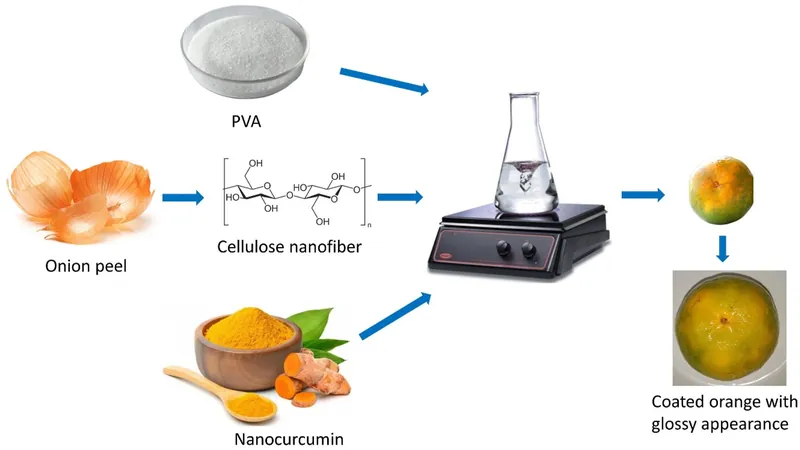
Revolutionary Coating Made from Onion Peel Promises to Keep Your Fruits Fresh for Longer!
2025-01-07
Author: Daniel
In a world where food waste has reached alarming levels, finding sustainable solutions to extend the shelf life of fresh produce has become a pressing concern.
The journey from farm to table is often fraught with challenges that lead to the spoilage of fruits and vegetables, causing significant waste. Traditional methods of cold storage and heavy-duty packaging are not only costly but also notoriously unsustainable, relying heavily on non-biodegradable plastics and harmful chemicals that threaten both our health and the environment.
However, researchers are turning the tide with an innovative approach. A groundbreaking study led by Poornima Vijayan at Sree Narayana College for Women in Kollam, Kerala, India, reveals a promising solution that blends nature with science: an edible nanofiber coating made from recycled onion skins.
Unlocking the Power of Nature
The secret sauce behind this revolutionary coating lies in cellulose nanofibers (CNFs) derived from the tough outer layers of onions, a byproduct that is often discarded. Coupled with a synthetic biodegradable polymer, polyvinyl alcohol (PVA), and the potent antimicrobial properties of nanocurcumin (extracted from turmeric), this coating offers a natural and effective shield against spoilage.
Vijayan and her team tackled the typical problems of CNF coatings, namely their lack of thermal stability and water resistance—issues that are especially acute in hot and humid regions. By creating a new formulation that integrates these three ingredients, they engineered a protective layer that withstands environmental stressors, thus maintaining fruit quality over time.
Tested and Proven: The Results Speak Volumes!
In their studies, the team applied this innovative coating to Mandarin oranges, dipping them in the mixture for a mere two minutes before letting them air dry. As the days went by, they meticulously monitored changes in the fruit's weight, acidity, and total soluble solids (TSS)—an essential indicator of freshness.
The results were nothing short of stunning! Oranges coated with the nanofiber film remained remarkably fresh and safe to eat, in stark contrast to the unprotected fruits, which started to show visible decay within just 13 days. The coated oranges exhibited minimal changes, signaling a significant victory in the battle against fruit spoilage.
A Game-Changer for Agriculture and Beyond
This groundbreaking research not only presents a sustainable way to keep our fruits fresh, but it also embodies the concept of “wealth from waste.” By transforming agricultural byproducts, like onion peel, into high-value protective coatings, we can help combat plastic pollution and lessen the health risks associated with conventional food packaging.
As Vijayan notes, "We present a sustainable solution for avoiding a growth in plastic pollution and lowering the health risks associated with microplastics from food packaging materials."
In a world thirsting for innovative and sustainable practices, this study provides a glimmer of hope. As final trials progress, the potential for these biodegradable coatings to revolutionize food storage and dramatically reduce food waste is within reach. So, the next time you enjoy a fresh fruit, consider the remarkable journey it took to remain on your table—thanks to the ingenuity of science and a little bit of nature!
 Brasil (PT)
Brasil (PT)
 Canada (EN)
Canada (EN)
 Chile (ES)
Chile (ES)
 Česko (CS)
Česko (CS)
 대한민국 (KO)
대한민국 (KO)
 España (ES)
España (ES)
 France (FR)
France (FR)
 Hong Kong (EN)
Hong Kong (EN)
 Italia (IT)
Italia (IT)
 日本 (JA)
日本 (JA)
 Magyarország (HU)
Magyarország (HU)
 Norge (NO)
Norge (NO)
 Polska (PL)
Polska (PL)
 Schweiz (DE)
Schweiz (DE)
 Singapore (EN)
Singapore (EN)
 Sverige (SV)
Sverige (SV)
 Suomi (FI)
Suomi (FI)
 Türkiye (TR)
Türkiye (TR)
 الإمارات العربية المتحدة (AR)
الإمارات العربية المتحدة (AR)